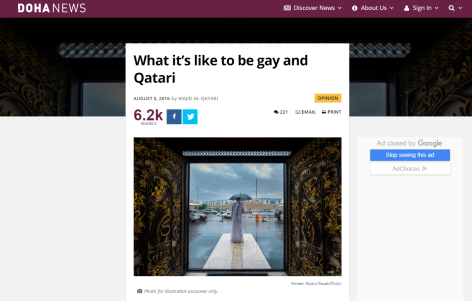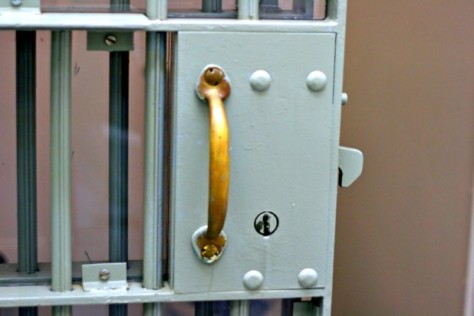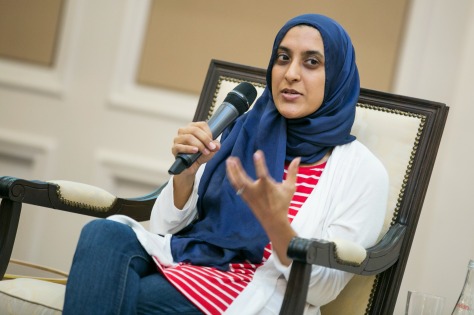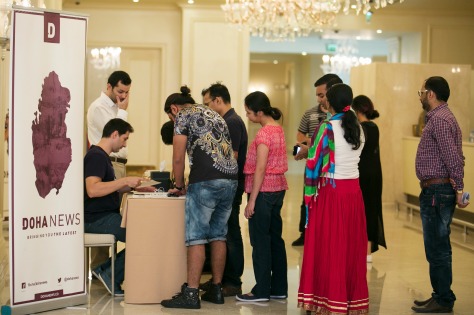This week, Qatar’s Emir told CBS that his country “wanted freedom of speech for the people of the region.”
Sheikh Tamim made the statement in defiance of demands from neighbouring nations that he should close the Qatar-funded news outlet Al Jazeera.
But while Qatar is busy patting itself on the back for bringing independent, Arab-led global news to the world, it is also busy suppressing similar voices at home.
Losing Doha News
Until very recently, I was Editor-at-Large of Doha News, Qatar’s most popular news website.
Founded in 2009 by two American journalists, Omar Chatriwala and Shabina Khatri, it stood up for truth, honesty and debate against a backdrop of the press release journalism published by local newspapers.
Doha News continued to stand for these principles even after Qatar’s government decided to block access to the site without warning last December.
And even then, despite having to shed most of its staff and move operations overseas, DN continued to publish well-researched, well-sourced, honest stories about Qatar.
And although DN no longer operated in Qatar and was therefore not beholden to local regulations, Qatar’s government persisted with its censorship of the site.
Sadly, the loss of traffic hurt advertising sales, and eventually Doha News’ founders could no longer continue to support it financially.
Sinking ship
In the hope of keeping the site alive instead of just shutting it down, it was sold last month to Star Reputation Consulting Ltd. The online media company from India said its goal is to promote “free and unbiased journalism.”

Initially, the plan was to retain the editorial team during a transitional period.
However, we decided to walk away after the company expressed a desire to enforce its own – undisclosed – editorial values on existing staff.
Since the sale, Doha News has published only a handful of articles, and sent out only a few tweets. The new owners do not appear to have hired new journalists, and for now at least, the future of the site seems bleak.
This is incredibly depressing, not only for the owners and staff of Doha News, who have worked tirelessly and at times at great personal risk for the cause of free media in Qatar, but also for Qatar’s residents.
They now have only a steady diet of propaganda, advertising and rumour with which to discern what is actually going on in the country they live in.
Required reading
Before the sale, Doha News was an integral part of hundreds of thousands of people’s daily lives. The founders’ brave journalistic principles made the site required reading for anyone interested in Qatar, and its social media following to date – 488k on Twitter and 386k on Facebook – meant that a sizeable percentage of the country’s 2.6m population was reading its output every day.
As Doha News grew, so did its team and its ambition.

It began as a Twitter feed that curated Qatar-related content, and then grew into a blog that included original reporting. The site gained a much larger following in 2012 during a fire at Villaggio mall that killed 19 people, most of them children.
As questions swirled about the blaze, Qatar’s television and radio stations remained silent. But the Doha News team live-blogged the disaster, sharing developments in real time.
Later, it was the only news outlet in Qatar to report on the Villaggio manslaughter trial, and the only one, incredibly, that actually named the high-ranking officials – one of whom was Qatar’s Ambassador to Belgium – who were convicted.
Controversial opinion pieces
Other ground-breaking stories of note include this report about the arrest of a Nepalese teacher for allegedly insulting Islam; these photos of a the reality of life inside a labor camp; this story of a woman jailed for giving birth to a baby outside wedlock; this story about the plight of homeless Iranians working in Qatar’s markets; this interview with a Filipina nanny about what it’s like to look after someone else’s children when you’ve had to leave yours overseas; and this coverage of a riot started by laborers on a building site.
The site also made a name for itself featuring positive, lesser-reported stories, like this tale about the family who have a tap outside their house offering free laban to all comers; this piece about a poetic restaurant worker; and this story about a local beekeeper.
 Alongside its reporting, the site also began publishing opinion pieces written by residents from all sections of Qatari society.
Alongside its reporting, the site also began publishing opinion pieces written by residents from all sections of Qatari society.
In some cases, these brought out into the open views that had never before been aired in the media in Qatar. Among them was this piece written by a Qatari who wanted to be allowed to marry a foreigner, and this piece by a gay Qatari man.
It was the latter op-ed that many believe to have been the catalyst for the website’s demise. Homosexuality is illegal in Qatar, and an open acknowledgement that some of its nationals may in fact be gay was too much for the conservative elements of its society.
The blocking of Doha News came as a surprise to us because – until then – we had genuinely had no governmental interference in our journalism.
Run-ins with the law
We took the government’s support of Al Jazeera to mean that officials at least quietly believed in our mission. Indeed, some government agencies shared DN stories on social media, and we were invited to government press conferences and events. Government officials even told us privately that they were fans.
However, the country’s cybercrime law, enacted in 2014, was used repeatedly to try to silence Doha News, threatening the freedom of its staff.
The legislation’s controversial privacy provisions make it illegal to publish news related to the personal or family life of individuals – even if the information is true.
The cybercrime law also contains a vaguely worded clause that criminalizes any content found to violate the country’s “social values” or “general order.”

These two sections are essentially a blank check to write a prison sentence on.
In July last year, Doha News’ former Assistant Editor Peter Kovessy was arrested and detained overnight for naming a convicted (expat) paedophile in a story. He was not charged, but forced to sign a document saying he would not write about the man in question again.
Months earlier, Peter was brought in for questioning after looking into a story about a moving company which had recently gone out of business, leaving many residents without their belongings.
Fearful of negative coverage, the owner had complained to the police and was able to force Doha News not to publish the story, despite the fact that it was entirely true.
A year before that, Shabina Khatri and I were called by the Criminal Investigations Department and brought in for questioning over a story.
I was pregnant at the time, and terrified I would be detained and that there would be no one to pick up my four-year-old son from school.
It turned out that the police simply wanted to know who had given us the information in a story about an alleged gang rape. The source, an embassy staffer, was clearly noted in the story, and eventually they let us go.
Unflinching
It would have been far easier to have altered our editorial line to avoid incidences like these; far easier to do what all other media outlets do in Qatar, and toe the line. But we didn’t. And that’s why Doha News was so important.
Untethered to influential owners, not pandering to fragile egos and unpersuaded by the ever-present media freebies – Peter once returned a gifted iPad to Qatar Rail and they asked him if it was broken – DN simply reported the truth.
That, then, is why I am treating Sheikh Tamim’s enthusiastic defense of free speech with immense skepticism.

It is not enough to insist that journalists in your employ should be allowed to report freely abroad (remember #journalismisnotcrime?)
No, if you are to avoid hypocrisy, you must also allow journalists in your own country to question, to probe and to analyze without fear.
A while ago, I was at a media function, and I got talking to a journalist who worked at one of Qatar’s major newspapers.
A talented reporter, he approached me earnestly with a list of stories he had wanted to investigate, but had been told by his paper’s editors that he could not. He desperately wanted to publish the truth as he saw it, but he was denied that chance.
In refusing to allow residents of Qatar to read Doha News, Qatar will now only have this sort of media: the media it deserves.
Doha News’ critics, small in number but very vocal, will get what they have wanted all along. A benign, malleable media, publishing advertorial rather than informative and useful news.
Lighting a torch
For our loyal Doha News readers who still want to know what’s going on around town, I have this advice: Maintain a healthy skepticism about all you read.
Join Twitter and save a #Qatar search; follow a wide range of publications and opinion-formers. If you read news from the broadest range of sources, the truth will be out there, somewhere in between.
And if, by any chance, there are Qatari men and women reading this who believe strongly in free media, I have a plea especially for you.

Take this opportunity to fill the void left by the old Doha News team. Start your own news website based on sound journalistic principles. Fund it well; give its editors free reign. Defend it against its inevitable detractors.
Qatar is a fascinating country going through a period of enormous change. It deserves to be studied and understood. Don’t let this period of time in Qatar pass you by in soft focus.
Good journalism casts light in the darkness; sharpens the image and brings much-needed clarity.
Grasp this opportunity and run with it.
Doha News has lit a torch – now it’s up to you to start a fire.


Reblogged this on Nervana and commented:
“While Qatar is busy patting itself on the back for bringing independent, Arab-led global news to the world, it is also busy suppressing similar voices at home.” Read the full piece for good insight on the situation in Qatar.
Many thanks to you, Omar, and Shabina, for your years of good work. I lived in Qatar for three years, and would regularly comment that you couldn’t get two expats together without someone citing an article from Doha News. You all made such a difference to the country.
I am saddened to see that Doha News is gone. But I will hold out hope that either it, or something like it, will return to Qatar someday.
Used to be an avid Doha News reader. Unfollowed now. Desperate for real news these days, I often google “Qatar news -peninsula “-gulf times””
Glad I came across your blog page. I am relieved that you and Shabina are still blogging and tweeting.
Thanks